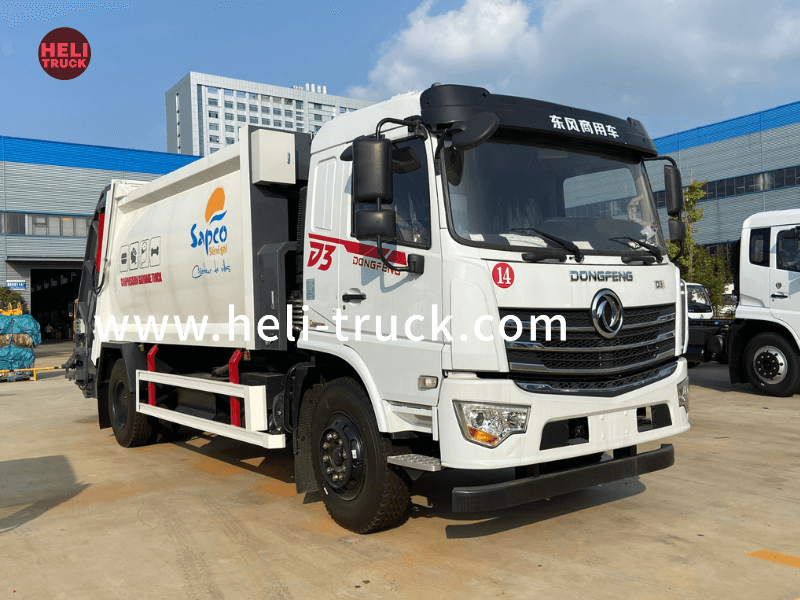Introduction
Garbage trucks play a critical role in waste management systems by collecting, transporting, and disposing of municipal solid waste. One of the key factors that influence the effectiveness of these trucks is their capacity, which determines how much waste they can carry in a single trip. Maximizing garbage truck capacity is essential for optimizing operational efficiency, reducing costs, and minimizing environmental impact. In this article, we will explore the different types of garbage truck capacities, factors influencing capacity limits, strategies for maximizing capacity, and the importance of efficient waste collection systems.
Types of Garbage Truck Capacities
Garbage trucks come in various sizes and configurations, each designed to meet specific waste management needs. The most common types of garbage truck capacities include:
1. Small Capacity Trucks: These compact trucks are typically used for residential waste collection in urban areas. They have a capacity ranging from 2 to 6 cubic yards and are ideal for navigating narrow streets and tight spaces.
2. Medium Capacity Trucks: Medium-sized garbage trucks are versatile vehicles that can handle a wide range of waste collection tasks. They typically have a capacity of 10 to 20 cubic yards and are commonly used for commercial waste collection and light industrial applications.

3. https://www.heli-truck.com/729/ : These heavy-duty trucks are designed for handling large volumes of waste efficiently. Large capacity trucks can have a capacity of 25 to 40 cubic yards or more and are often used for municipal waste collection, landfill operations, and other high-volume waste disposal tasks.
Factors Influencing Capacity Limits
Several factors influence the maximum capacity limits of garbage trucks, including:
1. Size and Weight Restrictions: Garbage trucks must comply with size and weight restrictions imposed by transportation authorities. These restrictions limit the maximum capacity of a truck to ensure road safety and prevent damage to infrastructure.
2. Compaction Systems: Many modern garbage trucks are equipped with compaction systems that compress waste to maximize storage capacity. The efficiency of the compaction system can significantly influence the overall capacity of the truck.
3. Payload Distribution: Proper distribution of the waste load within the truck is essential to prevent overloading and ensure safe transportation. Uneven distribution of the payload can affect the stability and handling of the vehicle.
4. Waste Density: The density of the waste being collected can vary depending on the type of material and compaction level. High-density waste such as construction debris or compacted trash may require a lower volume capacity to accommodate the weight restrictions.
Strategies for Maximizing Capacity
To maximize the capacity of garbage trucks and improve operational efficiency, waste management companies can implement the following strategies:
1. Route Optimization: Efficient route planning can help minimize travel time and maximize the amount of waste collected in a single trip. By optimizing collection routes based on factors such as traffic conditions, waste volume, and customer locations, companies can increase the capacity utilization of their trucks.
2. Compaction Technology: Investing in advanced compaction systems can enhance the storage capacity of garbage trucks and reduce the frequency of trips to disposal sites. High-quality compaction technology can efficiently compress waste, allowing trucks to carry more volume without exceeding weight restrictions.
3. Load Monitoring Systems: Installing load monitoring systems on garbage trucks can help operators track the weight and distribution of the waste load in real-time. By monitoring the payload carefully, operators can ensure that the truck is not overloaded and maintain optimal capacity utilization.
4. Waste Segregation: Implementing waste segregation practices at the source can help reduce the volume of waste collected and optimize the capacity of garbage trucks. Separating recyclable materials, organic waste, and hazardous substances can streamline the collection process and improve overall efficiency.
Importance of Efficient Waste Collection Systems
Efficient waste collection systems are essential for maintaining public health, preserving the environment, and promoting sustainable waste management practices. By maximizing the capacity of garbage trucks and optimizing collection processes, waste management companies can achieve the following benefits:
1. Cost Savings: Maximizing the capacity of garbage trucks can reduce the number of trips required for waste collection, resulting in lower fuel consumption, maintenance costs, and labor expenses. Cost savings can help companies allocate resources more effectively and improve profitability.
2. Environmental Impact: Efficient waste collection systems can minimize the carbon footprint of garbage trucks and reduce emissions of greenhouse gases and air pollutants. By optimizing capacity utilization and route planning, companies can contribute to environmental conservation and sustainable development.
3. Public Health and Safety: Timely and efficient waste collection is essential for preventing the spread of diseases, pests, and contaminants in communities. By maintaining clean and hygienic environments, waste management companies can protect public health and enhance the quality of life for residents.
4. Resource Conservation: Maximizing the capacity of garbage trucks and promoting waste segregation can help conserve natural resources and reduce the amount of waste sent to landfills. By diverting recyclable materials and organic waste from disposal sites, companies can support circular economy principles and promote resource recovery.
Conclusion
Garbage truck capacity is a critical factor that influences the efficiency and effectiveness of waste collection systems. By maximizing the capacity of garbage trucks through route optimization, compaction technology, load monitoring, and waste segregation, waste management companies can achieve cost savings, reduce environmental impact, enhance public health and safety, and promote resource conservation. Investing in efficient waste collection systems is essential for building sustainable communities and ensuring the long-term well-being of our planet.
